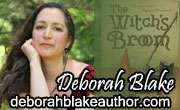Paganistan: Notes from the Secret Commonwealth
In Which One Midwest Man-in-Black Confers, Converses & Otherwise Hob-Nobs with his Fellow Hob-Men (& -Women) Concerning the Sundry Ways of the Famed but Ill-Starred Tribe of Witches.
On the Brilliance of 'Blessed Be'
“'Blessed Be': that's what the Satanists say to each other,” said my friend Blaine.
It was the early 70s. Blaine and I were both in high school. Clearly, he'd seen some TV special about contemporary witchcraft which he hadn't completely understood and, just as clearly, something about the saying had caught his fancy.
“Seems like a strange thing for Satanists to be saying,” I said.
I was making a point while trying not to seem to be making a point. I already knew a thing or two on the subject, quite enough to know that it most certainly was not Satanists who were saying “Blessed Be” to one another.
It was also enough to be abundantly clear to me which side of the Hedge I stood on myself.
Blessed Be. (That's three syllables now, not two.) It's a blessing; it's a spell. It means many things: Hello, Good-bye, Amen. It means: I'm one, and you're one too. It means: I acknowledge you as an equal. It means: We belong to the same tribe.
It's also an allusion to deep myth and liturgy. Blessed be the feet which have brought thee in these ways, says the Horned to the Lady in the Underworld, as he tenderly kisses said feet. This story, of course, is the mythic charter for initiation, as well as for the act of liturgical adoration, the Fivefold Kiss. (“What is the Five that is Eight?” is a kind of Wiccan koan.) Blessed Be: a world of meaning in two simple words.
(When I once met the Goddess in the middle of a flowering summer meadow—but that's a tale for another night—my knowledge of this rite gave me a fitting liturgical response to a theretofore—in my experience, anyway—unprecedented situation.)
After decades in the Craft, I'll admit that “Blessed Be” had, for the most part, donned something of an invisibility cloak for me: it's so ubiquitous that I'd almost stopped consciously seeing and hearing it. “BB!” friends often write, at the end of letters or e-mails, or sometimes even say: an intimate gesture, yet by that very intimacy rendered even more mysterious and in-the-know.
Anyone who knows magic knows that this is precisely the situation in which words have their most powerful effect: when they operate largely, if not wholly, on the unconscious level.
Not all religions have their own greetings, but the Craft—insofar, at any rate, as one may consider the Craft a religion—is one of them, and it's a brilliant stroke. The phrase seems innocuous, even benevolent, as, indeed, it is.
But don't be fooled.
It's deep, my friend: deep as the Underworld, deep as Love.
For whatever reason, “Blessed Be” had really sparked something in Blaine's imagination.
“Blessed Be!” we greeted one another in the halls of Harborcreek High School, for weeks after his discovery: the pretend Satanist and the would-be witch.
Comments
-
Please login first in order for you to submit comments
















